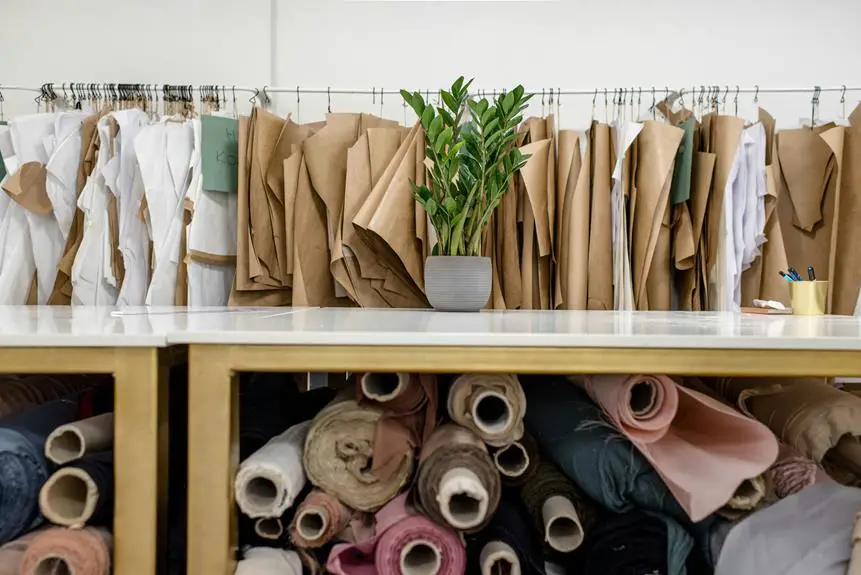When you think about muslin and cotton, it's easy to assume they're interchangeable, but that's not quite the case. Each fabric has distinct qualities that make it suitable for specific applications, whether you're dressing an infant or crafting a new project. While muslin's lightweight nature offers breathability, cotton provides softness and strength. Understanding these differences can significantly impact your choice, leading to better results in your work. So, what exactly should you consider when deciding between these two fabrics? Let's explore the nuances that could influence your decision.
Table of Contents
Key Takeaways
- Muslin is a lightweight, breathable fabric ideal for warm weather, while cotton is known for its softness and durability in everyday textiles.
- Muslin has a softer feel and good draping qualities, making it great for infant garments and crafting, whereas cotton offers a smooth, luxurious surface.
- Cotton fibers are stronger and more resistant to wear, leading to longer-lasting items compared to muslin, which may wear down faster.
- Muslin is often more affordable than cotton, making it suitable for budget-friendly projects, while cotton provides varied weights and finishes for diverse applications.
Overview of Muslin
Muslin is a lightweight, breathable fabric that's often made from cotton and is known for its versatility in various applications. You might find muslin used in everything from clothing to home décor. Its soft texture and ability to drape well make it a popular choice for crafting garments, especially for infants and toddlers. If you're looking for a fabric that's easy to work with, muslin's your go-to option.
When it comes to cooking, muslin shines too. You can use it to strain liquids, making it ideal for cheese-making or even brewing. It's also a great choice for covering food, allowing air circulation while keeping dust and insects away.
In art and design, muslin serves as a backdrop or base for painting, providing a smooth surface for your creative endeavors. Its affordability and availability in various widths and weights mean you can easily find the right type for your project.
Overview of Cotton
Cotton is a widely used natural fiber known for its softness, durability, and versatility in various textile applications. It's the go-to choice for countless products, from clothing to home textiles. You'll find cotton in everything from t-shirts to bed linens, and its breathable nature makes it perfect for warm climates.
One of the key advantages of cotton is its ability to absorb moisture, keeping you comfortable throughout the day. Additionally, cotton is relatively easy to care for, as it can be machine washed and dried without losing its quality.
Here's a quick comparison of cotton's attributes:
| Attribute | Description | Benefits |
|---|---|---|
| Softness | Feels gentle against the skin | Ideal for sensitive skin |
| Durability | Long-lasting and resistant to wear | Cost-effective over time |
| Versatility | Works in various products | Suitable for multiple uses |
With its many qualities, cotton not only meets everyday needs but also adds a touch of comfort and style to your life. So, whether you're shopping for clothes or home decor, cotton's a reliable choice.
Texture Comparison
When comparing muslin and cotton, you'll notice distinct differences in fabric feel and softness.
Each material offers unique breathability, which can impact your comfort level in various situations.
Plus, durability plays a crucial role in how well these fabrics perform over time.
Fabric Feel Differences
The texture of muslin tends to be softer and more breathable, while cotton often feels smoother and more luxurious against the skin. When you touch muslin, you might notice a slightly rougher texture, which gives it a unique charm, especially in casual clothing or home textiles. This makes it an ideal choice for lightweight garments and items like baby blankets or curtains, where a gentle feel is appreciated.
Cotton, on the other hand, boasts a refined texture that can range from crisp to plush, depending on its weave and finish. You might find that cotton's smooth surface enhances your comfort, especially in fitted sheets or dress shirts. Its luxurious feel often makes it a favorite for those looking for something a bit more upscale.
Both fabrics have their distinct qualities, but your preference will often depend on the specific application. If you're after a cozy, relaxed vibe, muslin might be your go-to. However, if you're seeking a polished and elegant touch, cotton could be the perfect fit.
Understanding these differences can help you make more informed choices for your wardrobe and home.
Breathability and Softness
While both muslin and cotton offer comfort, muslin excels in breathability, making it a great choice for warm weather and active wear. If you're looking for a fabric that allows air to circulate, muslin's lightweight and open weave is ideal, helping you stay cool and dry. You'll notice that muslin's breathability helps reduce moisture buildup, making it perfect for those hot summer days or intense workouts.
On the other hand, cotton, while also breathable, tends to retain more heat compared to muslin. Cotton's tighter weave can sometimes trap heat, which mightn't be as comfortable in sweltering conditions. However, the softness of cotton is undeniable; it provides a plush feel against your skin, often enhancing coziness in everyday wear.
When it comes to softness, both fabrics have their own appeal. Muslin, with its slightly crinkled texture, offers a unique softness that feels gentle yet durable. Cotton, however, is known for its smooth surface, making it a go-to for anyone seeking that classic, soft touch.
Ultimately, choosing between these two fabrics depends on your specific needs for breathability and softness.
Durability and Wearability
Muslin's lightweight texture may feel delicate, but it actually boasts impressive durability, making it suitable for both everyday wear and more demanding uses. You'll find that muslin withstands repeated washing and retains its structure over time, which is essential if you're using it for garments or home textiles. Its breathable nature also prevents overheating, adding to its wearability.
On the other hand, cotton offers a soft, familiar feel that many people love. While cotton is also durable, it can be heavier than muslin, which mightn't suit everyone's preference for lighter fabrics. Cotton fibers can wear down over time, especially if you frequently wash and dry them at high temperatures.
When it comes to texture, muslin provides a slightly crisper finish, while cotton feels softer against the skin. If you're looking for a fabric that combines both durability and comfort, consider how you'll be using it. For casual wear, muslin might just be your best bet.
If you need something for everyday use that's soft and cozy, cotton hits the mark. Ultimately, the choice depends on how you balance durability with the feel you want against your skin.
Breathability and Comfort
When choosing between muslin and cotton, you'll find that breathability and comfort play a crucial role in your decision-making process.
Muslin is known for its lightweight and airy characteristics, making it an excellent choice for hot and humid climates. Its open weave allows for better airflow, ensuring you stay cooler during warm weather. If you're looking for a fabric that feels comfortable against your skin while providing ventilation, muslin might be your best bet.
On the other hand, cotton is also breathable but tends to be slightly heavier than muslin. It provides a soft feel and is often more versatile, suitable for both warm and cooler temperatures. Cotton's breathability can vary depending on the weave; for instance, percale cotton is more breathable than sateen. If you prioritize comfort, especially for everyday wear, cotton offers a cozy option without sacrificing breathability.
Ultimately, your choice will depend on your specific needs. If you want something lightweight and airy for summer, choose muslin. If you prefer a soft, versatile option for various seasons, go with cotton.
Either way, both fabrics offer unique comfort levels tailored to your lifestyle.
Durability and Longevity
When it comes to durability, you'll want to compare the material strength of muslin and cotton.
Each fabric has its own characteristics that affect how long it lasts and how well it holds up over time.
Knowing the right care and maintenance tips can also make a big difference in extending the life of your fabric choices.
Material Strength Comparison
Cotton generally boasts greater durability than muslin, making it a more reliable choice for items that see frequent use. If you're choosing fabric for clothing, home textiles, or other applications, consider how each material holds up over time.
Here's a quick comparison to guide you:
- Tensile Strength: Cotton fibers are typically stronger and can withstand more stress without tearing. This means your cotton items can handle the rigors of daily wear and washing more effectively than muslin.
- Wear Resistance: Cotton's durability translates to better wear resistance. You'll find that cotton fabrics maintain their integrity longer, reducing the frequency with which you'll need to replace them.
- Longevity: When you invest in cotton, you're likely to enjoy your items for several years. Muslin, while useful for specific applications, simply doesn't offer the same lifespan, especially under heavy usage.
Care and Maintenance Tips
To keep your fabrics looking their best and extend their lifespan, follow these essential care and maintenance tips.
First, always check the care labels on your muslin and cotton items. While cotton is generally durable and can withstand machine washing, muslin is more delicate and often requires gentler handling.
When washing, use cold water and a mild detergent, as hot water can shrink or fade your fabrics. For muslin, hand washing is usually the safest option. Avoid bleach, as it can weaken fibers and cause discoloration.
Dry your cotton items in a dryer on low heat, but for muslin, air drying is preferable to prevent damage. If you need to iron, use a low heat setting for muslin to avoid scorching, while cotton can handle a higher temperature.
Store your fabrics in a cool, dry place, away from direct sunlight, which can fade colors and weaken fibers over time. Lastly, avoid overcrowding your closet, as this can lead to wrinkles and fabric stress.
Versatility in Uses
Muslin and cotton both offer a wide range of applications, making them popular choices in various industries. When you consider their versatility, you'll find that each fabric serves unique purposes that cater to different needs.
- Clothing: Cotton is a staple in everyday wear due to its softness and breathability. You'll find it in everything from t-shirts to dresses. Muslin, on the other hand, is often used as a base fabric for clothing prototypes or summer garments, thanks to its lightweight nature.
- Home Décor: Cotton's durability makes it ideal for curtains, upholstery, and bed linens. Muslin shines in the world of crafting; it's perfect for draping and creating soft, flowing elements in home décor projects.
- Art and Craft: Artists love using muslin for its texture and versatility in painting, printing, and quilting. Cotton also plays a role in crafting, especially for quilts and sewing projects, where its strength and variety of patterns can enhance your designs.
Choosing the Right Fabric
When selecting the right fabric, consider the specific needs of your project to determine whether muslin or cotton will best suit your requirements. Muslin is lightweight and breathable, making it ideal for draping and pattern making. Cotton, on the other hand, is durable and available in various weights and finishes, great for everyday clothing and home decor.
To help you decide, here's a quick comparison:
| Feature | Muslin |
|---|---|
| Weight | Lightweight |
| Breathability | High |
| Use Cases | Draping, pattern making |
| Cost | Generally lower |
| Feature | Cotton |
| Weight | Varied (light to heavy) |
| Breathability | Moderate to high |
| Use Cases | Clothing, home textiles |
| Cost | Can be higher |
Evaluate what you need for your project. If you're looking for something for a temporary project, muslin is a smart choice. But if you want something long-lasting and versatile, cotton might be your best bet. Always align your fabric choice with your intended purpose to ensure the best results.
Frequently Asked Questions
Can Muslin Be Bleached Without Damaging the Fabric?
Yes, you can bleach muslin, but be cautious. Use a diluted bleach solution and test a small area first. If you apply too much, it might weaken the fibers or change the fabric's texture.
Is Cotton Hypoallergenic for Sensitive Skin?
Yes, cotton's generally hypoallergenic, making it a great choice for sensitive skin. It's soft, breathable, and less likely to irritate. Just ensure it's free from dyes or chemicals that could cause reactions.
How Should Muslin Be Washed and Dried?
To wash muslin, use a gentle cycle with cold water and mild detergent. Avoid bleach. For drying, either air dry or tumble dry on low heat to prevent shrinking and maintain its soft texture.
Does Cotton Fabric Shrink After Washing?
Yes, cotton fabric can shrink after washing, especially if it's not pre-shrunk. To minimize shrinkage, wash in cold water and avoid high heat during drying. Always check care labels for specific instructions.
Can Muslin Be Used for Quilting Projects?
Yes, you can definitely use muslin for quilting projects! It's lightweight, breathable, and provides a lovely texture. Just make sure to pre-wash it to avoid any surprises, and you'll create beautiful quilts with ease.
- The Use of Nonwovens in Construction and Civil Engineering - July 11, 2025
- The Use of Nonwovens in Construction and Civil Engineering - July 11, 2025
- The Use of Nonwovens in Construction and Civil Engineering - July 11, 2025





